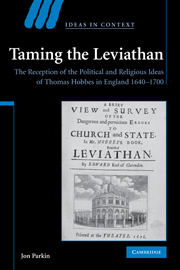 Taming the Leviathan
Taming the Leviathan Published online by Cambridge University Press: 05 May 2010
By 1700 the cumulative effect of five decades of critical engagement with Hobbes's writings had produced the images of the philosopher with which I began this book. Hobbes had attained a possibly unique position in the English imagination of the time. He had become a household name, but one associated with atheism, immorality, selfish behaviour, a poor view of human nature and unacceptable political views. Taken together these views constituted ‘Hobbism’, a well-documented creed to be detested by all God-fearing people and a set of views associated with a minority of ‘Hobbists’.
These debased disciples fell broadly into two categories; the libertine and the hypocrite. The libertine, typically young, always immoral and often drunk, is a stock figure by the later seventeenth century, a lively combination of Scargill and Rochester. Robert Dixon captures him in his Canidia:
The brave young Hobbist scorns and flies
The Inns of Court and Universities,
He vilifies the Man in Black,
Makes the poor Curate drunk with Sack.
In 1688 Jane Barker spots him with his friends up to no good, exemplifying the corruption of the town, when they:
Kick Tavern Boys, and Orange-Wenches wooe,
Are Machiavellians in a Coffee-house,
And think it wit a poor Street-Whore to chouse;
And for their Father Hobbs will talk so high,
Rather than him they will their God deny …
The other kind of Hobbist is the similarly irreligious but more calculating hypocrite whose superficial conformity to social norms and values conceals his adherence to the controversial philosopher.
To save this book to your Kindle, first ensure [email protected] is added to your Approved Personal Document E-mail List under your Personal Document Settings on the Manage Your Content and Devices page of your Amazon account. Then enter the ‘name’ part of your Kindle email address below. Find out more about saving to your Kindle.
Note you can select to save to either the @free.kindle.com or @kindle.com variations. ‘@free.kindle.com’ emails are free but can only be saved to your device when it is connected to wi-fi. ‘@kindle.com’ emails can be delivered even when you are not connected to wi-fi, but note that service fees apply.
Find out more about the Kindle Personal Document Service.
To save content items to your account, please confirm that you agree to abide by our usage policies. If this is the first time you use this feature, you will be asked to authorise Cambridge Core to connect with your account. Find out more about saving content to Dropbox.
To save content items to your account, please confirm that you agree to abide by our usage policies. If this is the first time you use this feature, you will be asked to authorise Cambridge Core to connect with your account. Find out more about saving content to Google Drive.